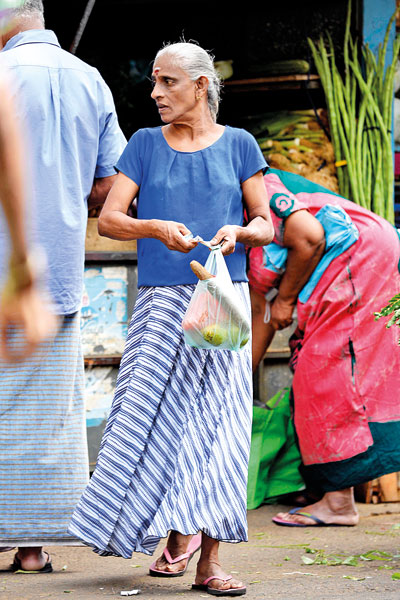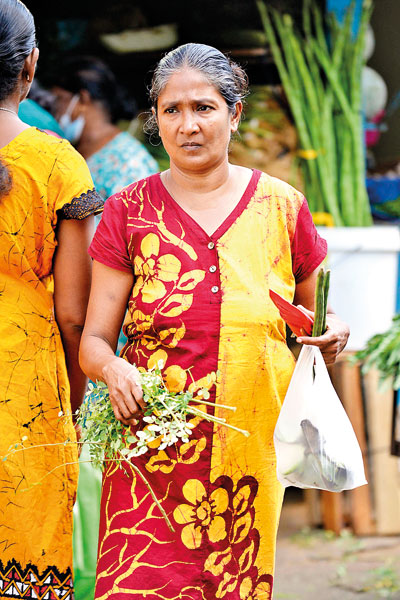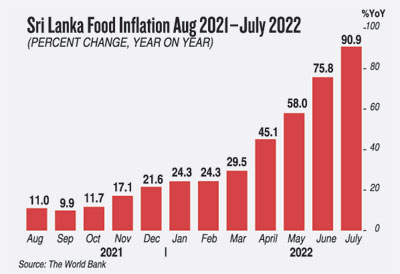News
Agriculture: Seven decades of progress destroyed in days
View(s):
Many people are unable to afford nutritious food
High food prices deny nutrition and protein people need; hidden hunger will be seen in two years, expert says
By Yoshitha Perera
Now a similar situation has been created in Sri Lanka. In the face of the current economic crisis, people are adopting different food patterns and due to the increase in food inflation, a situation is unfloding where people are unable to get the nutrition they need.
The country’s economy continues to deteriorate, with the World Bank rating Sri Lanka as the fifth among the ten nations with the highest food prices worldwide.
According to the World Bank’s Food Security Update, trade policy actions involving food and fertilisers have increased significantly since the start of the conflict in Ukraine. The research claims that as of July, Sri Lanka’s domestic food supply is significantly short. Due to a lack of fertilizer, the country’s agricultural output has dropped by 40 to 50 percent, and there are not enough foreign reserves to pay for imported food.
The cost of rice is one of the main issues faced in terms of human nutrition. Due to market distortion and unfavorable market conditions, the government control is also becoming more apparent than is warranted; while there are also moves to exert control over both the paddy market and the consumer rice market, according to Senior Agriculture Professor Buddhi Marambe of the University of Peradeniya.
“Of course, such price distortion could occur when these two factors are incompatible. Unfortunately, the end result was that both farmers and consumers suffered, particularly as a result of additional political factors over the last year,” he said.
The prices of many food items have skyrocketed and the country is experiencing the highest food inflation since independence. “I learned that August food inflation has even surpassed 93%. That itself speaks of a pathetic story,” Prof. Marambe said.
“Sri Lanka’s agriculture has evolved since Independence. The paddy alone, which is our staple food crop, had an average yield of 650kg per hectare in the1950s and in 2021 it has increased upto 4,670kg per hectare.
“We have been breeding rice varieties in this country and about 98 percent of the cultivated rice in Sri Lanka was from high yielding varieties. This is the progress we have made in the past but this has been turned upside down because of a policy decision taken without going by the evidence and the available scientific research,” he said.
Paddy is the country’s main food crop, maize is the country’s main animal feed crop and tea is the country’s main export crop. “If you take all these three crops and try to represent the overall agriculture sector in terms of crop production the same situation has happened. The work that has been done for the past seven decades has been destroyed in days,” Prof. Marambe explained.
He said that with the proper planning and execution the current food crisis could be managed but still it would take another two to three harvest seasons to revive the country’s agriculture back to the normal process.
“If we take the human food component, the availability and accessibility of food is affected not only because of the paddy production but also because of the fuel crisis. There is an affordability issue as well. Consumers and producers are affected at the same time. We cannot forget that producers are also consumers,” he said.
The whole 22 million population is in trouble because of the food inflation, especially the most vulnerable communities, the pregnant women, lactating mothers and children. These are identified as vulnerable communities not only because of the affordability part but also with the lack of nutrition.
The World Food Programme (WFP) in its situation report and the United Nations also categorically said that a significant amount of people in Sri Lanka have changed their food habits and some people have skipped one meal. “That is not a good sign. It will certainly reduce the food pressure but that is not what we need as a nation. We have to understand this fact,” he said.
“Food shortage is something that we can feel but we will understand the hidden hunger part after about two to three years. The hidden hunger is protein and malnutrition. The inflation has affected that as well and the prices of the cheapest protein source, chicken eggs and chicken meat, have increased in the recent past, making them unaffordable to the majority of people,” Prof. Marambe said.
Animal production is linked to crop production and the authorities have to make a lot of efforts in terms of food security in the country, he said.
“Maize is our main animal feed crop and the production has dropped drastically by about 65-70 percent during the last Maha season. The majority of the maize cultivation is happening in the Maha season because of the rainy conditions. The main ingredient for the animal feed is not available in our country and that resulted in a high cost of animal feed production because maize has to be imported at least in lower quantities. Whichever we look at, there is a scarcity,” he said.
Small and Medium scale Enterprises (SMEs) Management Consultant Tuan Jamaldeen said most food items had gone up in prices, the latest being the prices of eggs.
“Ours is a completely import heavy economy and not an export-driven economy. The controlled exchange rate was let go by the government as it could no longer subsidise it due to the bankruptcy. Price of any ingredient that was imported in the production of finished products went up including chicken feed and packing materials,” he said.
Trade, Commerce, and Food Security Minister Nalin Fernando also discussed the challenging process of addressing the present food crisis and outlined the actions being taken to address the problems in livestock production.
The Minister said he had proposed a Cabinet paper to lower the tax on raw materials to expand the export market for animal production. “Our main goal is to expand the export market. We will take action to lower the price of fish, chicken meat, and eggs within the next two weeks,” he said.
The best way to say that you found the home of your dreams is by finding it on Hitad.lk. We have listings for apartments for sale or rent in Sri Lanka, no matter what locale you're looking for! Whether you live in Colombo, Galle, Kandy, Matara, Jaffna and more - we've got them all!

